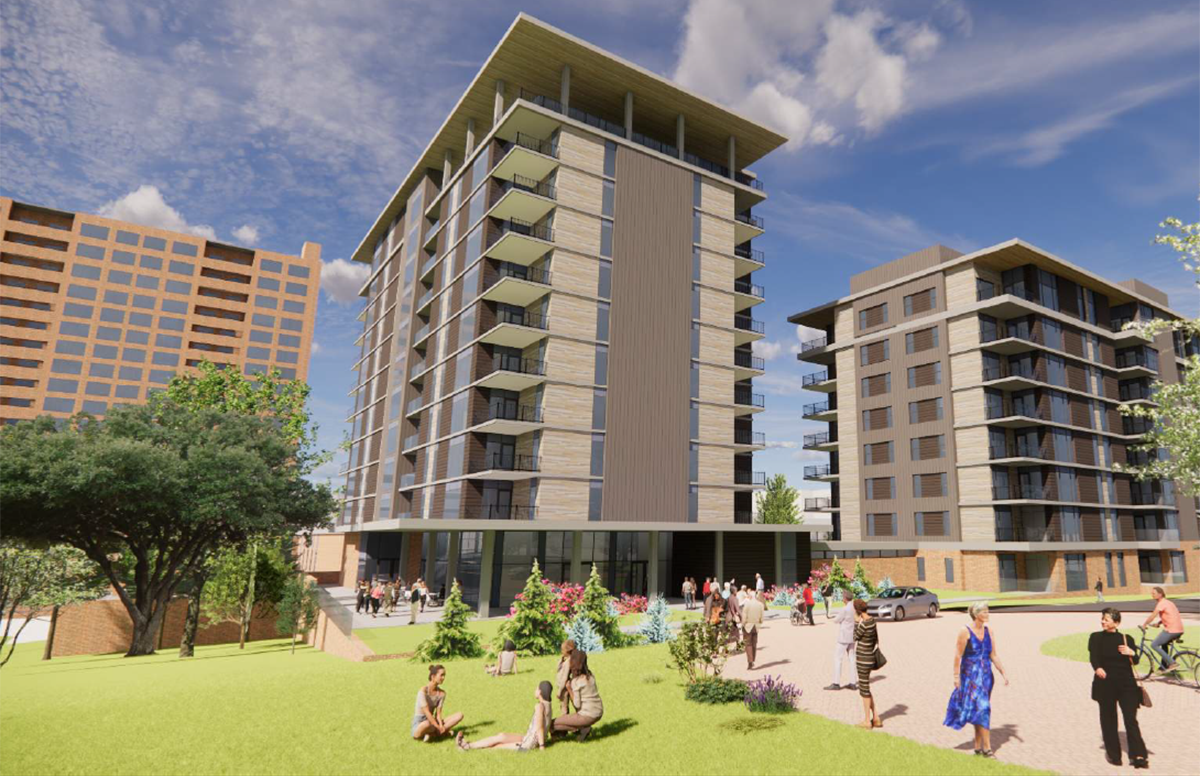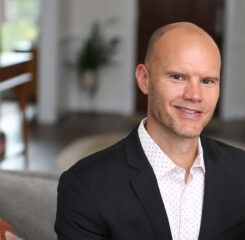Edenwald, a LeadingAge member in the Baltimore suburb of Towson, MD, sits adjacent to Goucher College, a liberal arts and sciences institution. The proximity is no coincidence, because the life plan community is built on land purchased from Goucher in 1980. But ties between the next-door neighbors go deeper; there are numerous Goucher alumni and retired faculty among Edenwald’s residents. Now, the two organizations are strengthening their connection by taking steps to form a university-based retirement community (UBRC), joining a steadily growing movement of such affiliations. LeadingAge-member examples include Lasell Village in Massachusetts, Oak Hammock at the University of Florida, and Kendal at Oberlin in Ohio.
Edenwald is aiming to break ground for the new community, to be built on three acres of land leased from Goucher, in late 2025. Approval from the Maryland Department of Aging, a major hurdle, was overcome earlier this year, though design approvals are still being sought. Edenwald will hold a 99-year lease on the land, with the option to purchase it at a predetermined price at the end of that time.
“The plan is to build three towers over a parking garage and [add] a plaza deck between the three towers,” says Edenwald President and CEO Mark Beggs. “There will be a 12-story tower and two nine-story towers, totaling 127 independent living apartments and an additional 25,000 square feet of amenity space that is really focused on intergenerational programming that will be used by both the college and us.” Marketing to prospective residents is underway.
A UBRC is an affiliation between a retirement living provider and a college or university that allows cross-cultural engagement between older adult residents and students and faculty from the higher education institution. Residents can take classes and access social and cultural programming at the college, while students can get course credits, volunteer, or even live in the retirement community. University Retirement Communities.com estimates there are 75-100 retirement communities with some type of association with an academic institution in the United States; most of the affiliations have been established since 2000.
Edenwald residents and Goucher faculty have already adopted the UBRC spirit and created intergenerational programming independently. A class called Lost Arts, hosted at the college, has featured residents teaching students under-taught skills, such as crocheting. One resident, owner of a 3-D printer, taught students how to use it. Another initiative paired centenarian residents with students, who did an art project using the residents’ life stories.
“Goucher [understands] that the population shift is dramatic,” says Beggs. “Given that, Goucher sees reaching an older demographic as a smart strategic move. It’s also acknowledging that as the population ages, the workforce ages, so one of the things they really need to position themselves for is their students working in an intergenerational environment.”
The planned amenity space at Edenwald will include classrooms, a movie theater, an additional dining venue, and a yoga studio. Atop the 12-story building will be an event space that overlooks the campus, to be shared with Goucher College. An indoor walkway will connect the existing Edenwald campus to the new towers. Beggs says the new apartments should add about 180 new residents, bringing the community’s total census close to 600.
Changes in the existing Edenwald building will fit naturally into the UBRC concept. “Our original building has a lot of studios and one-bedrooms, and we’ve been taking the studios out of service,” Beggs says. “Some are being combined with other apartments to make larger units, but we’ll have 10 to 15 studio apartments that will be made available to students in the existing building.”
The organization has an in-residence program, usually housing two musicians associated with the Peabody Institute of The Johns Hopkins University. Beggs says the concept can be expanded to include students in social work, nursing, or pre-med, from Goucher and possibly other colleges, who would receive free housing and a meal plan in exchange for service requirements in the community. Space can also be offered to visiting faculty or guest lecturers as needed.
“Ultimately, it is just residents and students and faculty joining together in a collaborative fashion,” Beggs adds. “One vision Goucher has is to create program classes that really can only happen if they are intergenerational. If you’re looking at history, let’s say race riots back in the 1960s, you can have the class involve residents who actually were marching.”
Photo: A rendering of the new Edenwald independent living community to be built on the Goucher College campus. Image courtesy of Edenwald.
Do you have a story of innovation in care and services to tell? The LeadingAge Story Collector, powered by Greystone, makes it easy to submit yours. Try it now.

 Shutdown Week Three: Impact of Ongoing Closure on Affordable Housing
Shutdown Week Three: Impact of Ongoing Closure on Affordable Housing


